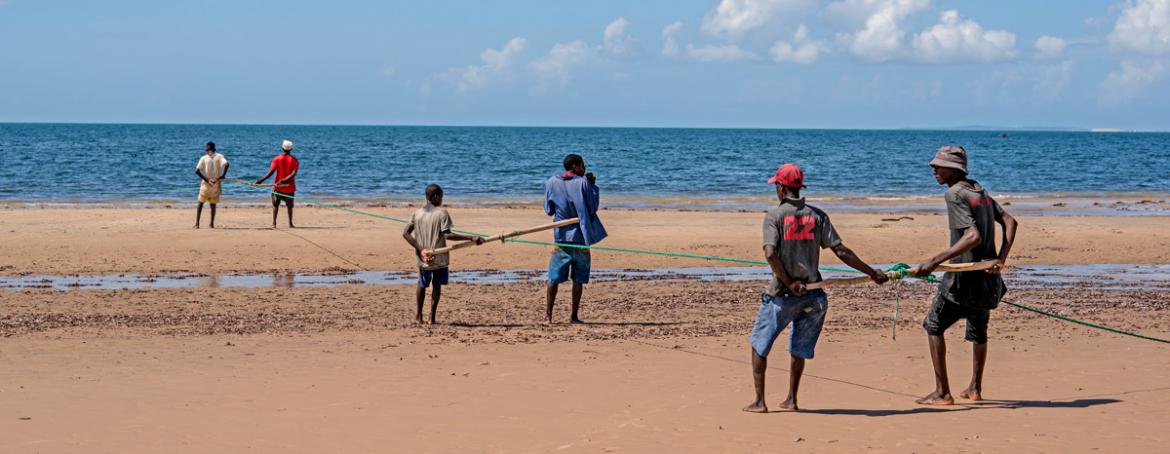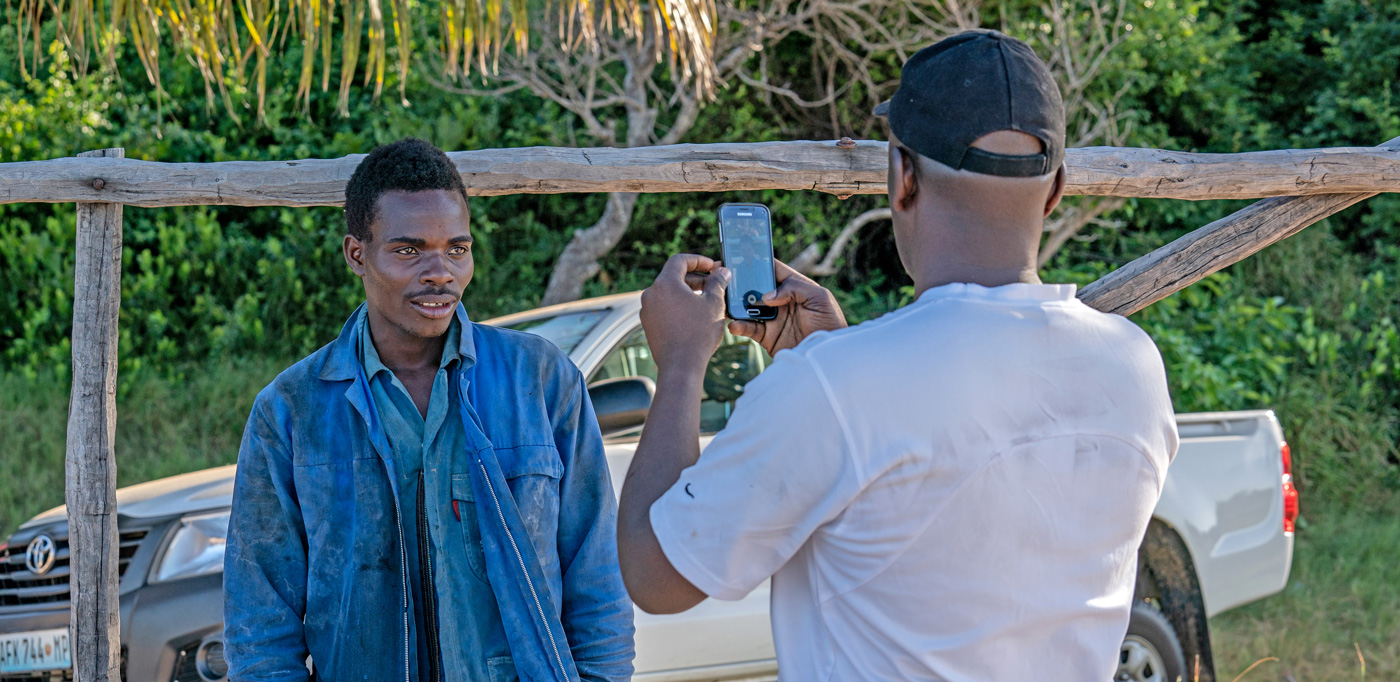On an April morning in the Mozambican fishing community of Fuquete, about 20 local fishers take the short dirt roads from their neighborhoods to the beach for a day of fishing. They fish with a beach seine, a giant, faded green net that piles up in their arms as they bring it out across the sand. After they tow it out into the water, the fishers eventually pull the net back in with its catch, moving together, side by side. They will split the earnings from what’s inside, with the fish buyers who provide the supplies.
In coastal fishing communities like Fuquete, fishing is the backbone of the local economy. Fishing has some part in the life of every member of the community, whether for food or livelihood. The catch and earnings come from smallscale fishing, an informal and decentralized sector with sparse infrastructure and resources, and very little information about what goes on under the surface of the fishery’s waters or in local fish markets. Their potential for prosperity is stunted by that lack of accessible catch data, which is needed to make informed management decisions and be seen by national governments in policymaking and investment. Without critical data on their conditions, small-scale fisheries have become known by another name: the “invisible fisheries.”
This year, a conservation group called Rare has been piloting a mobile app system called OurFish to bring essential fishery information out of isolation and into the hands of local fishers, their communities, and their governments. With OurFish, they can discover the real and full impact of the small-scale fishing sector, and learn what it will take to transform it. The people of Fuquete took their first steps in using OurFish this spring, when fishers registered as users in the system.

33-year-old Felipe Viegas has been fishing in Fuquete since he was 12. When he was nine years old, his father used to be able to catch around 10 tons of fish in a single outing. “They even lifted the net to get less fish, to be able to preserve the fish,” he says. Productive fishing enabled his father to put Viegas and his older brothers through school. Since then, however, overfishing has taken its toll on the fishery. “The catches aren’t like before,” he says. “Now, the tendency of the catches is to slow down.”
In small-scale fisheries, the problem of overfishing is building with growing local populations and demand for fish. Competition breeds attempts to fish whenever and wherever possible, and under such conditions, fisheries are stuck in a dynamic of overfishing and decline. To the rest of the world, the problem can seem small when isolated to a small fishing community like Fuquete. But small fishing communities dot nations’ coasts by the hundreds, their people add up in millions, and their sector’s overall stake in global fishing is actually huge: 90 percent of the world’s fishers and fish workers operate in small-scale fishing, and about half of the total global fish catch comes from small-scale fishers. Overfishing is taking place all over the world, and so is the decline of fish populations that millions depend on for food and jobs.
Judite Pakal, Director of Economic Activities in Fuquete’s wider coastal district of Inhassoro, says that fishing needs to change throughout the area. “Really, something must be done,” he says. “If we leave it as it is, things won’t get better. There’s the need to implement some measures with the goal of increasing the quantity of fishing, and consequently, the catches.” That extends to how catch data is collected. “There really is something missing because not all of the fishermen give the information, not all the boat owners give the information,” says Pakal. “We have the samplings that are made by colleagues, but we need to improve the data collection system for the catches.”
Rare has been piloting a mobile app system called OurFish to bring essential fishery information out of isolation and into the hands of local fishers, their communities, and their governments.
Rare aims to empower communities most dependent on the oceans to change fishing practices and manage their fisheries more sustainably. The group works with local leaders to show communities that alternatives to overfishing exist, and can empower them economically, socially, and as protectors of their marine environment. Rare’s fisheries program revolves around community-led establishment of a management approach called “managed access + reserves.” It combines managed access, a system in which local fishers receive exclusive fishing rights in a specific area of their coastal waters, with marine reserves, where no fishing is allowed. Pairing the access areas with reserves creates a back-and-forth of protection and restoration: local fishers adhere to the nearby marine protections to benefit from the restored fish populations they support.
The approach rests on support from the community. Asking fishers to stop overfishing their waters requires a big shift in thinking from the short-term gains of the practice to the long-term benefits of limiting use and protecting marine areas. Rare has four decades of expertise in behavior change for conservation. The organization trains local people to lead social marketing campaigns that tap into the latest behavioral insights to change how communities perceive, use and manage their natural resources. Rare factors into each campaign its gathered insights on how group norms affect individual behavior, how emotional appeals affect decision-making, and more.
If applied behavioral insights are the means to getting communities to absorb a message of conservation, data is the substance they need to figure out how they can best execute it — how, for example, to design a managed access + reserve area that works with the unique conditions of each fishing community and its waters. Having solid information on fish landings — their volume, composition, and trends over time — enables communities to recognize patterns in their catches, learn successes and failures of management decisions, and adjust their decision-making accordingly.

Steve Box, the head of Rare’s global fisheries program, was driven by his belief in the importance of fisheries data to lead the development of OurFish, a mobile app system that makes the collection of small-scale fisheries data easier for people with immediate access to it — local fishers that produce the catch and buyers who resell it in markets.
Users open up the OurFish app to find a simple, icon and imagebased interface, modeled after the way Steve Box and his team saw data being recorded in fishing communities. In coastal communities, the slim amount of data recorded is usually done so by buyers, who use pen and paper to log their purchases from fishers at landings. OurFish was designed around buyers using the app to log transactions — logging details on the fish species, weight, count and price in real time.
Where digitizing and collation of recorded data usually take months, even years, to happen in small-scale fishing communities, those steps take place instantly within OurFish. For years, 57-year-old Fuquete fish buyer Eulalia Batista has recorded the fish quantities she buys in a notebook, for personal reference. Batista plans to use the app, and looks forward to the knowledge it could bring. “To me, it’s welcome,” she says.
40-year-old government staffer Anuar Amade has been working with communities in Inhassoro for the past eight years, and in 2016 became the manager of a sustainable fishing campaign supported by Rare in Inhassoro. In April, Amade and support staff showed people in Fuquete how to use the OurFish system and registered its first fisher users in April. Every transaction that buyers log into OurFish is attached to the fisher who produced the catch, through identification information that can be scanned into the app from QR codes on the back of ID cards that fishers receive when they register.
It means that I am a real fisherman.”Felipe Viegas, Local fisher in Fuquete
For many of the fishers who register with OurFish, it is the first time they are acknowledged as professional fishers. When Amade demonstrated the app in Fuquete and began registering the first fishers willing to join OurFish, other fishers in the community began lining up to join and receive their own ID card. Even the basic tactile sensation of holding a card that named them as fishers by profession had meaning. When Felipe Viegas registered, he felt different. “It means that I am a real fisherman,” he says.
For fishers and buyers like Felipe and Eulalia, the app can be more than an information-gathering and learning tool. OurFish uses the moment at which fishers and buyers interact as the point of data collection, which allows them to include not just details about catch, but also the price at which they are sold and a digital record of evidence that a financial transaction took place. In a sector where paper trails have been virtually nonexistent, fishers can provide income statements and prove their financial histories.
Having that history is a big deal for the fishers and communities who want more for themselves — to transition from the informal economy of small-scale fisheries to a formal one. “What we’re doing with the OurFish app is looking backwards to see the actual income of the fisher and the community, through the data flowing into the OurFish app,” says Carlos Arango, Senior Manager for Economic Resilience in Rare’s fisheries program. “Building proof of income and financial statements will provide fishers with a deeper understanding of their own fishing business and finances, and eventually can lead to using that information as evidence to take out loans from financial institutions.”
Building proof of income and financial statements will provide fishers with a deeper understanding of their own fishing business and finances.”Carlos Arango, Senior Manager for Economic Resilience, Rare
All of this starts with allowing fishing communities like Fuquete to discover and sign onto OurFish. Once fishers are registered in the community, OurFish can be rolled out with buyers to record catch. Rare will pilot the app in six of its sites in Mozambique, and aims to expand from there. The app is fully functional, and Steve Box and his team are working on its second version, which incorporates input from users in other countries where OurFish has been operating for the past couple of years. As part of this process, they are looking at the critical step that comes after data is digitized and collated by the system: sharing it back. They intend to share interpreted data in as digestible a format as possible, so user feedback will be important. To make it accessible, the team has created an online “data dashboard” that people can access to explore data findings.
With its campaign and OurFish, Rare’s ultimate goal is to help fishers and their communities get the information and support they need to change their lives. Campaign manager Anuar Amade says the intervention, both in implementing managed access + reserves and opening up access to information through OurFish, has people talking about what could be. “Everyone is hoping to see what the result will be,” he says. “They’re aware that the reduction in catches is something evident and that there is a necessity to create conditions for fish recovery, because the base of support of the communities really comes from the fishing activity.”